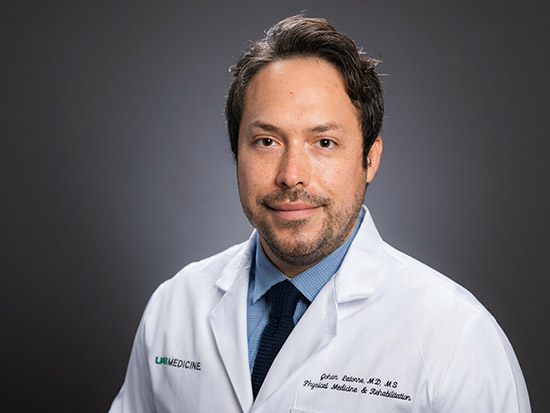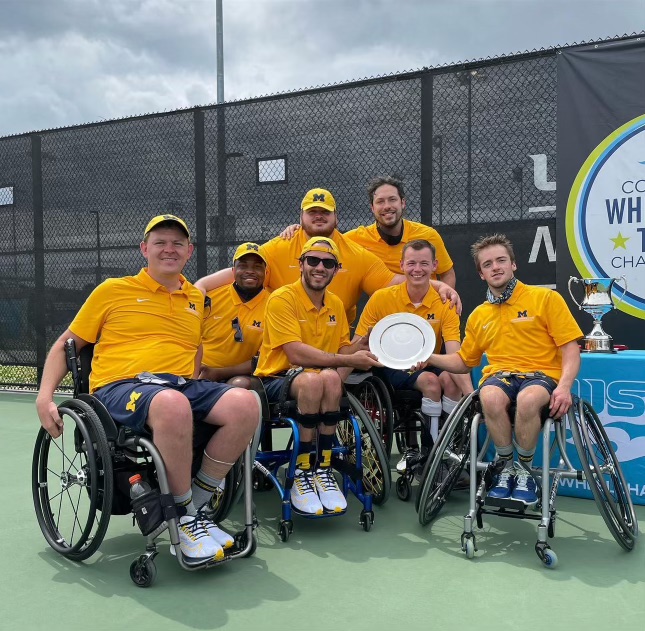 As a provider for UAB Sports and Exercise Medicine, Johan Latorre, M.D. specializes in non-operative orthopedic, musculoskeletal, and sports medicine. He is passionate about treating athletes at all levels and abilities.
As a provider for UAB Sports and Exercise Medicine, Johan Latorre, M.D. specializes in non-operative orthopedic, musculoskeletal, and sports medicine. He is passionate about treating athletes at all levels and abilities.
Besides providing excellent clinical care to his patients at UAB, Latorre is also the head team physician for the men's and women's tennis teams at the university and a team physician for Team USA Wheelchair Rugby who train at Birmingham’s Lakeshore Foundation.
This month marks the beginning of the Paralympics Games Paris 2024 spotlighting adaptive athletes. In November 2023, Team USA Wheelchair Rugby claimed its qualifying spot in Paris for the Paralympic Games.
We spoke with Dr. Latorre to learn more about adaptive sports.
 What are adaptive sports?
What are adaptive sports?
Adaptive sports are recreational or competitive sports for persons with disabilities.
When did you develop a passion for adaptive sports?
As a medical student, I learned about Physical Medicine and Rehabilitation late in my third year. I finally rotated at the inpatient rehab hospital late that academic year and just by chance, Kennedy Krieger’s Wheelchair Rugby Team came to Penn State for an exhibition/showcase for the rehab hospital. Seeing excitement on all the patients’ faces, especially those who had recently had an injury, was inspiring to watch. After the exhibition, you could see how much more motivated the patients were to be discharged so they could try out different adaptive sports.
Why are adaptive sports important?
Adaptive sports are important as it is a vehicle for individuals with disabilities to not only obtain the physical and mental benefits of exercise but also to experience all the other benefits such as leadership, teamwork, comradery, and competition.
What is something you would like people to know about adaptive sports?
Just because adaptive athletes have a disability, it does not mean that an able-bodied individual would be able to sit in a wheelchair and suddenly be better than an elite adaptive athlete. Adaptive athletes work to become the best at their sport, the same as any other able-bodied athlete does for their sport.
What has been your involvement in adaptive sports over the years?
As a resident and fellow at the University of Michigan, I was one of the first members of the Adaptive Sports and Fitness Program. We started out with WC Basketball pickup once a month to slowly increasing frequency and adding other one-time events. Eventually, Covid hit and while all that was paused, we planned our first collegiate team, WC tennis. Once restrictions were lifted, we trained daily working towards Nationals as it would be the first tournament after Covid. We competed and came in second place against an Alabama team that had internationally ranked players. Once I graduated, I joined UAB’s Dept. of PM&R and UAB Sports and Exercise Medicine. That allowed me the opportunity to serve as one of the team doctors for Team USA WC Rugby who have so far won a gold in the Para Pan Games and is on a mission for gold in Paris at the Paralympics this month.
How long have you been a team physician with Team USA Wheelchair Rugby?
I was fortunate enough to begin once I arrived at UAB in the Fall of 2022 and have been a proud team physician for them since. What is your long-term vision for working with adaptive athletes? I hope to continue working with adaptive athletes both on and off the field. One of my major goals is to attend a Paralympic game as a team physician in the future and to hopefully start a collegiate team here at UAB!
Dr. Latorre is active in the rehabilitation and sports medicine community. He is a member of the American Medical Society of Sports Medicine, and American College of Sports Medicine. Additionally, he is actively involved with the American Board of Physical Medicine and Rehabilitation and serves as Chair of the Adaptive Sports Community in American Academy of Physical Medicine and Rehabilitation.
To learn more, listen to Dr. Latorre’s MedCast session where he shares the benefits and barriers of adaptive sports.